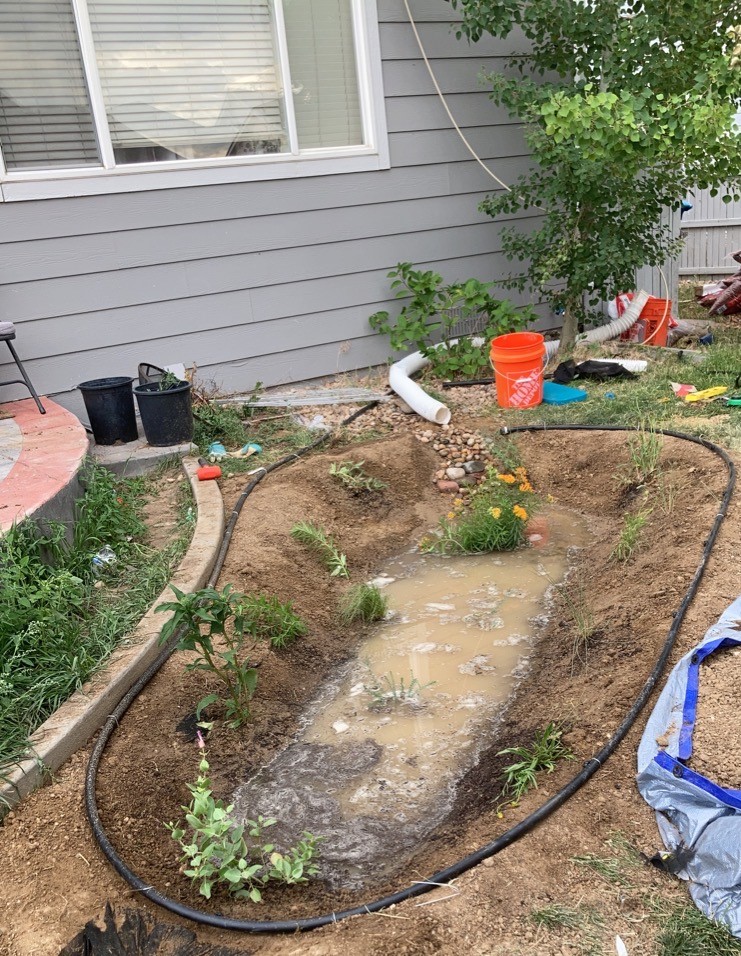Rain Garden Installation_DEACTIVATED

Project Overview
During the summer months, approximately 50% of the daily residential water consumption in Colorado is used for outdoor irrigation purposes (Waskom and Neibaur, 2014). Municipalities, water providers and water conservation organizations have encouraged and incentivized their constituents to remove turf, plant xeric gardens, and install water efficient landscape equipment.
While these programs have contributed to water savings, additional research is needed to continue transforming Colorado landscapes away from turf and towards landscapes that thrive using the average amount of rainfall received in our arid state.
Installing rain gardens is a water conservation strategy which includes the added benefits of reducing stormwater runoff and enhancing water quality. We hypothesize that significant barriers to installing rain gardens include uncertainty around what plants to use and the steps for proper rain garden installation.
Key DELIVERABLES
This project seeks to reduce barriers by creating several important educational and outreach activities and materials:
- Bilingual Rain Garden Installation Guide
- Rain Garden Planting Layouts
- Certified Rain Garden Installation Course
- Onsite, hands-on installation training activities
- Survey results for understanding barriers to rain garden adoption
Project Team
- Jessica Thrasher – Colorado Stormwater Center
- Project Role: Principle Investigator
- jessica.thrasher@colostate.edu
- Dr. Mazdak Arabi, Professor – Colorado State University Dept of Civil and Environmental Engineering.
- Project Role: Co-Investigator
- mazdak.arabi@colostate.edu
- Riley Lynch
- Project Role: Program Assistant
- riley.lynch@colostate.edu
- Mia Campbell
- Project Role: Program Assistant
- mia.campbell2@colostate.edu
COLLABORATORS
This project includes collaboration across CSU disciplines and with a variety of external water partners. Three faculty will include a Rain Garden class lecture in Fall 2021/ Spring 2022: Dr. Jennifer Bousselot (Horticulture and Landscape Architecture), Dr. Howard Ramsdell (Environmental and Radiological Health Sciences), and Dr. Stephanie Kampf (Ecosystem Science and Sustainability). Additionally, Deryn Davidson, Interim Extension Director Jefferson County, CSU Extension has agreed to collaborate on this project.
Our external partners for this project include: Frank Kinder, Water Efficiency Programs Manager, Northern Water; Kate Rentschlar, Environmental Planner, City of Fort Collins Natural Areas Department; Pam Sunderland, Community Outreach & Programs Manager, High Plains Environmental Center; and Basil Hamdan, Stormwater Quality Engineer, City of Fort Collins Utilities Department.
Community Engagement
This project involves the installation of up to 17 rain gardens across Front Range communities. At this time, the rain gardens are planned for installation in Fort Collins, Highlands Ranch, Denver, Boulder County, and Greeley. Should funding allow, additional communities may be approached as well. Community support is critical to the success of this project, thus we are partnering with the following water providers and municipalities to fund materials for the demonstration gardens:
• Northern Water
• Nature in the City/City of Fort Collins
• City of Greeley
• Centennial Water and Sanitation District
• Mile High Flood District
Our partners will also help select the demonstration sites/ locations and assist will recruiting employees, students and/ or community members to participate in the bilingual Certified Residential Rain Garden Installation Training Course. Sites in lower-income or historically disadvantaged communities will be prioritized for installing demonstration gardens which require establishment watering for the first 2-3 years post-installation. To ensure that maintaining the rain gardens does not pose a financial burden on low-income homeowners, rain barrels will also be installed at these locations to provide additional water supplies for establishing the rain garden. Community stewards will be identified to maintain the gardens and educate their fellow community members.